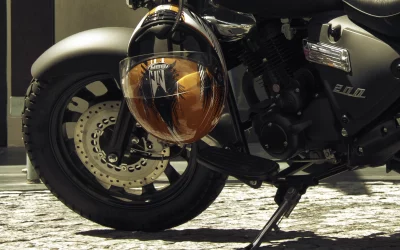LEGAL RIGHTS TO COMPENSATION FOR MOTORCYCLE PROPERTY DAMAGE
A motorcycle owner has a special bond with his or her car. While a motorcycle is not an alive, breathing entity, the emotional effect on a motorcycle owner when their machine is injured in an accident is significant. Some motorcycle owners spend many hours working on their motorcycles or having others work on them to enhance the motorcycle’s performance, operation, and appearance. Many motorcyclists do not feel the same way about their motorcycle after being damaged in an accident.
While there is an emotional attachment to motorcycles, the state of Colorado, like most others, does not recognize any property damage claims beyond complete loss (if applicable), repairs, and decreased Value (if applicable). In other words, unlike if you were hurt, a motorcycle owner cannot sue for pain, suffering, mental anguish, or loss of enjoyment of life just because the motorcycle was damaged in the accident.
Free Consultation
In Person | Phone | Zoom
Damage to a motorcycle’s property – Repairs and Recoverable Damages
When it comes to property damage and repairs, three types of insurance will pay for or cover the costs.
Property Damage Insurance is a kind of insurance that protects you if Property Damage insurance is required in Colorado for all registered motor car owners. Motorcycles, on the other hand, are not obliged to obtain this form of coverage. If it can be shown that the motor car owner or permissive driver was careless, this insurance will reimburse losses to the other party.
Let’s imagine someone driving an SUV and making a sloppy left hand turn into a motorcyclist’s travel lane. The motorcycle gets damaged in a collision. The repairs are expected to cost $3,000, and the motorcycle is worth about $10,000. The repairs should be covered by the at-fault driver’s property damage adjuster in this case.
Collision insurance is a kind of insurance that protects you in the event of a collision Collision insurance for motor car and motorcycle owners are optional in Colorado. As a result, many car and motorcycle owners choose not to obtain Collision Insurance since the prices are greater when this coverage is included.
Collision insurance is highly recommended by most insurance brokers and Colorado Motorcycle Accident Attorneys. Let’s assume a person driving a car rear-ends the back end of a motorcycle. The motorist receives a ticket and even confesses to being at fault in the accident.
Unfortunately, the driver’s insurance was allowed to expire due to non-payment. While the driver is theoretically and legally accountable for the damage to the motorcycle, collecting cash or money from a motorist who did not have the foresight or means to pay his insurance premium may be problematic.
While it is unjust, the rider may be forced to decide how to pay for the repairs. Collision Insurance would be quite beneficial in these scenarios, which would cover or pay for the damages/repairs to the motorcycle regardless of guilt or the availability of insurance for the at- fault motorist.
Coverage is comprehensive. Comprehensive Insurance in Colorado would cover the repair or entire loss of a motorcycle caused by anything other than an accident or collision. Fire, theft, vandalism, weather, and other occurrences are examples of covered events or accidents.
When acquiring insurance and subsequently attempting to apply or use the benefits to pay the loss, damage, or repairs, it is critical to read and comprehend the coverage wording in the policy.
Motorcycle Damage Assessment: Repairs, Diminished Value, and Total Loss Claims
Following a motorcycle accident, the motorcycle owner is confronted with a slew of concerns and obstacles. While emergency medical treatment and medical stability take priority over other concerns, the damage to the motorcycle must be addressed. The motorcycle may sustain substantial damage because many motorcycle accidents involve colliding with a much larger car or a stationary object such as a railing. The question of whether to repair or replace the motorcycle is a common problem in many motorcycle claims. In most cases, insurance companies will only consider a motorcycle to be totaled if the cost of repairs exceeds 80% of the motorcycle’s worth. Even if the motorcycle may be restored for a cheaper cost than the motorcycle’s Value, the insurance adjuster will most likely declare the motorcycle a complete loss in certain scenarios. While many motorcycle owners would like to have their motorcycle repaired rather than declared a complete loss, insurance companies usually take a hard line on total loss judgements. These judgments are seldom open to court review, nor are they worth the time, effort, or price of initiating a lawsuit to challenge.
If the motorcycle is fixed, the owner is left with a motorcycle that never appears right or rides differently from before the accident. A motorcycle owner might claim “Diminished Value” damages for the motorcycle in specific situations. To put it another way, as fixed after the accident, the motorcycle is not worth as much as it would be if it had never been damaged. It’s worth noting that Diminished Value claims are usually only covered by the at-fault driver’s car insurance policy’s property damage coverage. Diminished Value is normally not covered by a motorcycle insurance policy, even if the rider has collision insurance.
How does one determine a motorcycle’s Diminished Value? This is a fantastic question. Following a motorcycle accident, it is beneficial to have a motorcycle evaluation conducted. The repair cost, brand, model, mileage, and the general market for the motorcycle as it exists after the motorcycle accident may all be evaluated by an appraiser or specialist in the area of motorcycle sales. After that, the appraiser/expert may evaluate the motorcycle’s current worth to the market for a comparable motorcycle that hasn’t been destroyed. The Diminished Value is the difference between these two numbers. It should be noted that the insurance company’s decreased value judgement may vary from that supplied by the chosen appraiser/expert. To address the situation, the decreased value claim might be discussed or contested as needed.
In motorcycle accident claims, insurance coverage and the complexities of repairs, complete loss, and Diminished Value may be rather perplexing. As a result, a motorcycle owner should obtain legal counsel, assistance, and representation from a Colorado Motorcycle Accident Attorney on these and other matters, such as personal injury, medical costs, and compensation/settlement.
Damage to a Customized Bike / Motorcycle Compensation
Following a motorcycle accident, various difficulties and questions emerge about the motorcycle’s repair, lowered Value, and outright loss. It might be difficult to know which insurance provider to contact and what will be covered in the event of a motorcycle accident.
What if my motorcycle is a one-of-a-kind creation? Is it possible to receive a valuation for my bespoke components or paint? Like so many others that emerge in the aftermath of a motorcycle accident, the answers to these inquiries are contingent on the facts, circumstances, and insurance coverage wording.
Some insurance companies may give you a stated value coverage, which means you and the insurer agree on the replacement value of the motorcycle during the application process, and you pay the premium based on that Value. Naturally, the bigger the value, the larger the premium. Other regulations allow for “Betterments” to be paid for. Enhancements are another phrase for improvements. Customized paint, more chrome, additional lighting, bigger rims and tires, and so on are examples of this. When you apply for insurance, most plans that provide coverage beyond the fair market value require you to identify the customized items and tell the insurance company their worth. Some insurance plans may include Betterments without charging an extra premium if you can establish the worth of the add-on items (with receipts) such as custom paint, exhausts, lighting, seats, and so on. Your motorcycle insurance coverage should be reviewed with your agent regularly to ensure that your policy covers the money you spend customizing your motorcycle.
When pursuing a property damage claim against the at-fault driver’s car insurance company, the insurance company may show resistance and unwillingness to pay for losses related to the custom motorcycle’s Betterments, extras, or enhancements. Insurance adjusters are tough to work with, even in a scenario involving a pretty conventional motorcycle property damage claim.
It is apparent that the motorcycle owner has a strong attachment to the car and is more interested in seeing it properly fixed or replaced than any insurance company. To effectively and thoroughly prosecute a property damage claim, collision claim, or comprehensive insurance claim on behalf of the motorcycle owner, it is frequently beneficial to have legal counsel.
When it comes to property damage claims, what is a deductible?
Deductibles are common in property damage insurance policies. When you file a claim for property damage, you’ll have to pay a deductible. This implies you’ll have to pay the deductible you agreed to when you bought the insurance before the insurance company would pay anything. If the damage does not exceed the deductible, the insurance company will not compensate you. If the cost is higher than the deductible, the insurance provider will cover the difference between the deductible and your payment amount. The most frequent deductible for any incidence that damages your motorcycle is $250. Some deductibles might go as high as $1,000. Some insurance may not need a deductible. For example, if your deductible is $1,000 and the cost of repairing your motorcycle is $950, you will be responsible for the full repair. If you don’t have a deductible, on the other hand, the insurance provider will cover the whole cost of the repair.
Deductibles are a financial consideration. Insurance is more expensive if there is no deductible and less expensive if there is. The smaller the premium, the larger the deductible.
The simplest approach to a deductible is this: after paying my premiums, how much more money do I want to spend on fixing my motorcycle? The authors advise against adding insult to injury by choosing the lowest deductible possible. The writers also advise that you maintain track of any maintenance and improvements made to the motorcycle so that you may discuss the fair market value with your claims adjuster if necessary.
Cana Biker Collects Only Pain, Suffering, and Mental Anguish Associated with Motorcycle Damage?
Many bikers/motorcyclists consider their motorcycles to be a significant part of their lives. When it comes to buying, maintaining, and repairing a motorcycle, a lot of time, money, effort, and emotion goes into it. The owner of several motorcycles treasures and values them. When a motorcycle is damaged or destroyed, the owner has an emotional reaction that may lead to a sense of loss. It’s normal for a motorcycle owner to be outraged when their motorcycle is damaged or wrecked due to the irresponsibility of another individual. While the sensations and emotions are real and honest, the legal issue is whether any identifiable compensation is available for these damages or losses under Colorado law.
Regrettably, the short answer is “No.” Under Colorado law, a motorcycle owner cannot sue for pain, suffering, or loss of enjoyment of life merely because of the motorcycle’s damage. Consider the case of Joe Smith, who owns a motorcycle. A car driver rear-ends the back of Joe’s motorcycle. A ticket is given to the driver, and the motorcycle is repaired. The total cost of the repairs was $1,500. The $1,500 was paid by the at-fault driver’s insurance carrier. Joe Smith did not sustain any personal injuries and did not seek medical assistance. Joe Smith was naturally upset about the damage to his motorcycle, which he had owned for the last five years. Before the accident, the motorcycle was in good condition. In this case, Joe Smith would not be entitled to any damages for pain, suffering, or loss of enjoyment of life. There may be a separate claim for the motorcycle’s diminished Value. For example, if the motorcycle had a market worth of $10,000 previous to the accident and now has a market value of $8,000, a Diminished Value claim for $2,000 might be pursued; however, this claim only refers to the motorcycle’s loss of Value and not to the motorcycle owner’s emotional loss.
If a biker has personal injuries due to a motorcycle accident and seeks medical care, a claim or lawsuit for “non-economic damages,” such as pain, suffering, mental anguish, and loss of enjoyment of life, may be pursued. It might be difficult to pursue a personal injury claim or lawsuit. Even when the injuries seem to be connected to the motorcycle accident, insurance companies may question the injuries or just adopt a strong posture to put greater pressure on the motorcyclist to accept a settlement that is not in line with the claim or case’s fair worth.







